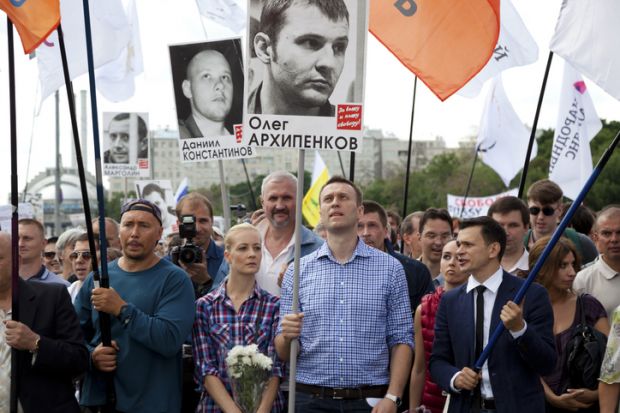On 24 February we entered the third year of horrific Russian violence in Ukraine. Much of that violence has been indiscriminately targeted by the invader against civilians, residential buildings and Unesco cultural sites. In some cases, whole cities have been razed to the ground.
In Russia, meanwhile, Kremlin propaganda conjures false realities while new waves of repression target anyone who dares to criticise the war – culminating, just before the invasion’s second anniversary, with the murder of Russian opposition leader Alexei Navalny.
As a Russian studies scholar, I have struggled with how to best approach my profession since the invasion began. I absolutely do not equate all Russians with the Kremlin, but the situation has called for a re-evaluation of how we study Russia and Russian culture in light of everything being done in its name.
Over time, I have come to view my classroom as a training ground for citizenship. In this context, I see my discipline as one of many that can and should loudly tell the story of authoritarianism. Understanding what authoritarians do to their subjects powerfully illuminates the meaning of citizenship, with its powers, privileges and inviolable function in the preservation of democracy.
The Kremlin targets individuals through arrests and fines, but also by banning books and silencing speech, eroding citizenship to the point that individuals no longer feel at liberty to exercise it freely. When that doesn’t work, it resorts to violence. It poisoned Navalny in 2020, but he survived and returned to Russia in 2021 because he dreamed of democracy and balance of power, a real parliamentary system and an independent judiciary to boot.
Navalny knew citizenship and democracy within himself, even if the same could not be true of those who immediately imprisoned him for “extremism”, kept him in solitary confinement for 300 days, moved him to a colony in the Arctic Circle and, ultimately, killed him. Every time he faced his jailers, he spoke out against Putin’s regime and the war in Ukraine, amassing new “criminal” charges for simply behaving like a citizen with the right to free speech.
People in Moscow were arrested for putting flowers in Navalny’s memory on the Solovetsky memorial stone that honours the victims of Russia’s distinctive history of repression. Yet as many as 16,500 attended his funeral, openly criticising Putin as they stood in line – a rare manifestation of citizenship under the cover of mourning.
In a Russian higher education system that has long pulled out of the Bologna process and been stripped of even the most basic standards of academic freedom, these moments of historical significance can never be properly analysed or even mentioned. Education plays an essential role in both the preservation and the fall of democracy, so it should come as no surprise that Putin has taken an active interest in it.
Last autumn, the Kremlin effectively ended the teaching of liberal arts in Russia by closing the Smolny College of Liberal Arts in St Petersburg. Authoritarians have no use for a mode of education that fosters independent thinking among younger generations. Instead, Putin recently unveiled a mandatory sequence of ideological courses, “the foundations of Russian statehood”, which articulates the Kremlin’s view of history and aims to make Russia’s global isolation palatable through the construct of a distinctively Russian civilizational model that reeks of exceptionalism and unreality.
Because of this weaponisation of education by autocratic regimes, institutions of higher education in free countries must make preservation of democracy an intentional part of our teaching. And Putin is quite right that a liberal arts approach, founded on independent, non-ideological critical thinking may well be the best way to do so. Its multidimensional and individualised curricular flexibility requires students to participate in courses that, as well as offering the basics of disciplinary training, teach them to grapple independently with global issues such as the pitfalls of AI, the perils of climate change and the true significance of the decline or collapse of democracy.
While we in free countries often take democracy for granted, individuals living under authoritarianism sometimes write the most extraordinarily poignant tributes to it, which we would do very well to study. They offer first-hand accounts of how subjects are stripped of layers of citizenship, at times to the point of being reduced to what Italian philosopher Giorgio Agamben calls “bare life” – whose only defining characteristic is that it can be ended.
I spend a lot of time teaching ethics through stories, both true and fictional, historical and contemporary, that introduce tangible stakes. I want to keep sharing the writings of gulag survivors such as Varlam Shalamov and Evgenia Ginzburg, as well as the many war testimonials, poems and documentaries from Ukrainian writers and journalists that memorialise the Russian government’s actions against Ukrainians. In addition to helping us understand the true face of authoritarianism – and why democracy is worth fighting for – these stories project the voices of individuals who have held on to their self-conception as citizens despite violent attempts to turn them into something less.
Memorialising testimonials of how authoritarianism infringes on our basic freedoms, dignity, ideals and even our very lives can impassion students to champion human rights, freedom and the broader citizenship of groups and individuals. Because, however enshrined it is in law, democracy is most vibrant when reinforced through individual understandings so personal that they enable citizens to almost instinctively recognise manifestations of its lack.
Ani Kokobobo is professor and chair of Slavic, German and Eurasian studies at the University of Kansas.
Register to continue
Why register?
- Registration is free and only takes a moment
- Once registered, you can read 3 articles a month
- Sign up for our newsletter
Subscribe
Or subscribe for unlimited access to:
- Unlimited access to news, views, insights & reviews
- Digital editions
- Digital access to THE’s university and college rankings analysis
Already registered or a current subscriber? Login








